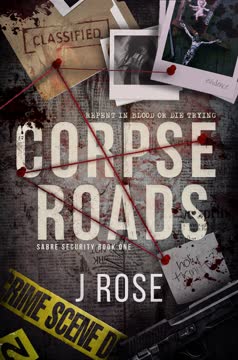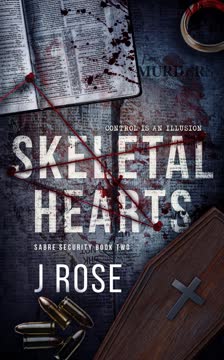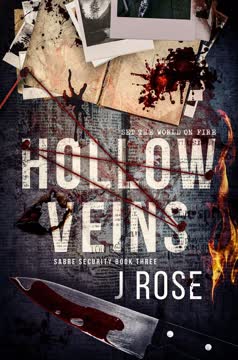Plot Summary
Born in Darkness
Harlow's earliest memories are of darkness, hunger, and violence. Raised in a basement by the sadistic Pastor and Mrs. Michaels, she is told she is a sinner, punished for imagined crimes, and forced to witness the ritualistic abuse and murder of other girls. Her only comfort is fleeting connections with fellow captives, whose stories and deaths haunt her. Harlow's identity is shaped by trauma, obedience, and the constant threat of pain, her sense of self eroded by years of captivity and indoctrination.
The Cage and the Devil
Harlow's life is a cycle of deprivation, beatings, and psychological torment. The Michaels enforce their twisted faith through violence, using Harlow and other girls as objects for their rituals. Harlow learns to survive by suppressing hope, but the arrival and loss of each new captive chips away at her soul. The devil is not a myth but the man who holds the keys to her cage, and the only escape seems to be death or total submission.
Escape into Night
When the Michaels leave to find another victim, Harlow, feverish and near death, uses the bones of a dead friend to break free from her cage. Driven by the memory of those she's lost, she escapes the basement, navigates the abandoned chapel above, and smashes her way out through a stained-glass window into the cold, wild woods. Injured and terrified, she flees into the unknown, her first taste of freedom as terrifying as her captivity.
The First Living Victim
Sabre Security, a private firm led by Hunter, Enzo, and Theo, is investigating a string of ritualistic murders. When a living victim—Harlow—is found, her survival is unprecedented. The team takes her into protective custody, recognizing her as both a key witness and a person in need of care. Harlow's body bears the same scars as the murdered girls, and her fragmented memories are the only hope of catching the killer.
Sabre Security's Hunt
Hunter, Enzo, and Theo are haunted by their own traumas and the unsolved case. They take Harlow into their fortified home, balancing professional detachment with growing personal investment. As they care for her, they confront their own grief, especially the loss of Alyssa, a woman they all loved. Harlow's presence begins to heal old wounds, but also exposes new vulnerabilities.
Haunted by Ghosts
Harlow struggles to adapt to freedom, plagued by nightmares, flashbacks, and guilt over the girls she could not save. She forms tentative bonds with her protectors, especially Enzo and Leighton, but is haunted by the belief that she is broken and unworthy of love. The ghosts of the past—both literal and psychological—threaten to pull her back into darkness.
Newfound Family, Old Wounds
As Harlow recovers physically, she is drawn into the chaotic, caring world of Sabre Security. She learns to navigate ordinary life—showers, food, affection—while the men struggle with their own demons. Leighton, recently out of prison, becomes a source of comfort and mischief. The household is a patchwork family, each member scarred but searching for connection.
The Slow Burn of Trust
Harlow's relationships with Hunter, Enzo, Leighton, and eventually Theo deepen, complicated by attraction, trauma, and the unconventional bonds they form. The men are drawn to her resilience and vulnerability, and she, in turn, finds safety and acceptance. Their affection is slow-burning, fraught with setbacks, but transformative for all involved.
Fractured Memories
Therapy and daily life trigger fragments of Harlow's lost past. She remembers names, faces, and horrors, but the truth of her identity remains elusive. The team uncovers that the Michaels are not her real parents; she was kidnapped as a child, her true name Leticia Kensington. The revelation shatters her sense of self, forcing her to confront the possibility of a family she never knew.
The Weight of Survival
Harlow is tormented by survivor's guilt, believing she is responsible for the deaths of the other girls. She develops compulsive behaviors, including self-harm, as a way to cope with overwhelming pain. The men try to support her, but the darkness inside her is persistent. The case intensifies as the killer taunts Sabre Security, threatening more deaths if Harlow is not returned.
The Ties That Bind
Harlow meets her biological mother, Giana, but the reunion is fraught with pain and alienation. She feels like a stranger in her own life, unable to reconcile her past with her present. Meanwhile, the men's own family dynamics—Hunter and Leighton's strained brotherhood, Enzo's grief, Theo's isolation—mirror Harlow's struggle to belong. Together, they form a new kind of family, bound by choice rather than blood.
The Past Unburied
The investigation leads the team to the abandoned chapel where Harlow was held. She insists on accompanying them, determined to face her demons and help find justice for the other victims. The search is harrowing, the chapel a mausoleum of pain. They discover the remains of the Michaels' crimes, including the body of Mrs. Michaels and evidence of Laura's fate.
The Monster's Mark
Pastor Michaels remains at large, having murdered his wife and vanished. He taunts the team with threats and fresh killings, making it clear that Harlow is still his target. The team realizes the depth of his depravity and the challenge of bringing him to justice. Harlow's memories reveal that some victims, like Kiera, may have known the killer, suggesting a more complex motive.
The Truth of Names
Harlow, now aware of her true name and history, must decide who she wants to be. She is not the sum of her suffering, nor the property of her abusers. With the support of her new family, she begins to forge a new identity, integrating her past and present. The process is agonizing, but necessary for healing.
The Price of Freedom
Harlow's journey is marked by sacrifice—her own innocence, the lives of others, and the safety of those she loves. The men risk everything to protect her, and she, in turn, fights to reclaim her agency. The case takes a toll on everyone, exposing the limits of justice and the enduring scars of trauma.
The Return to Hell
The team's return to the chapel is both a literal and symbolic descent into hell. Harlow faces the physical remnants of her captivity, the bodies of the dead, and the ghosts of her past. She finds Mrs. Michaels' corpse, a final testament to the cycle of violence. The confrontation is cathartic but incomplete—the true monster, Pastor Michaels, is still free.
The Final Reckoning
With the killer still at large, the team is left with more questions than answers. Harlow's confession that she killed Laura to spare her suffering adds another layer of complexity and guilt. The investigation continues, but the focus shifts to survival and recovery. The bonds between Harlow and the men deepen, their unconventional love a source of strength.
Aftermath and Unfinished Business
As Christmas approaches, the household tries to find moments of joy and normalcy. Harlow's healing is slow, marked by setbacks and small victories. The team remains vigilant, knowing the killer is still out there. The story ends with the arrival of a mysterious, broken man at their door—Harlow's real father—hinting that the past is not done with them yet.
Characters
Harlow Michaels / Leticia Kensington
Harlow is the protagonist, a young woman raised in captivity by sadistic pseudo-parents. Her psyche is shaped by years of abuse, deprivation, and indoctrination. She is resilient, resourceful, and haunted by guilt over the deaths of other girls. Her journey is one of reclaiming agency, identity, and the capacity for love. Harlow's relationships with her rescuers are complex, blending trauma-bonding, gratitude, and genuine affection. Her development is marked by the struggle to integrate her past with her present, and to believe she is worthy of happiness.
Hunter Rodriguez
Hunter is the head of Sabre Security, a man defined by loss, discipline, and a relentless drive for justice. He is emotionally guarded, scarred by the death of Alyssa and his own hearing loss. Hunter's relationship with Harlow is initially professional, but deepens into a slow-burning, passionate connection. He is both a source of safety and a mirror for Harlow's pain, struggling to balance his need for control with his growing vulnerability.
Enzo Montpellier
Enzo is Hunter's best friend and the emotional core of the team. He is physically imposing but deeply compassionate, carrying the weight of his own family's tragedies. Enzo is drawn to Harlow's fragility and strength, becoming her protector and confidant. His love is nurturing, patient, and fiercely loyal. Enzo's development is tied to his willingness to open up, confront his grief, and accept the possibility of happiness after loss.
Leighton Rodriguez
Leighton, Hunter's younger brother, is recently out of prison and struggling to find his place. He masks pain with humor and bravado, but is deeply affected by guilt and a sense of inadequacy. Leighton's bond with Harlow is playful and tender, offering her moments of levity and acceptance. His journey is one of self-forgiveness and the search for belonging, both in his family and with Harlow.
Theo Young
Theo is the team's intelligence expert, brilliant but socially withdrawn. He is haunted by the loss of Alyssa and his own sense of alienation. Theo's connection with Harlow is intellectual and gentle, rooted in shared trauma and a love of books. His development involves rejoining the family he left behind, learning to trust again, and allowing himself to care deeply.
Pastor Michaels
Harlow's captor and abuser, Pastor Michaels is a sadistic, narcissistic killer who uses religion to justify his crimes. He is both a literal and psychological monster, shaping Harlow's worldview and sense of self. His influence lingers long after his physical presence, manifesting as internalized shame, fear, and self-loathing in Harlow.
Mrs. Michaels
Mrs. Michaels is complicit in the abuse, enforcing the rules of the cage and participating in the violence. She is cold, cruel, and ultimately a victim of her husband's brutality. Her death in the chapel is both a literal and symbolic end to Harlow's captivity, but her legacy of pain endures.
Brooklyn West
Brooklyn is a member of the extended Sabre Security universe, herself a survivor of trauma. She becomes a mentor and friend to Harlow, offering support and understanding that the men cannot. Brooklyn's presence underscores the theme of found family and the possibility of healing.
Kade and Hudson Knight
Members of the Cobra team, Kade and Hudson are skilled, reliable, and protective. They provide backup and expertise during the investigation, embodying the professionalism and camaraderie of Sabre Security.
Giana Kensington
Harlow's biological mother, Giana, is a figure of both hope and disappointment. Their reunion is fraught with pain, as Harlow feels alienated from the life she lost. Giana's presence forces Harlow to confront questions of identity, belonging, and forgiveness.
Plot Devices
Fragmented Narrative and Multiple POVs
The story alternates between Harlow's first-person experience and the perspectives of her rescuers. This structure allows for a nuanced exploration of trauma, recovery, and the impact of violence on both victim and protector. The use of present-tense, stream-of-consciousness narration immerses the reader in Harlow's fractured reality, while the men's viewpoints provide context, tension, and emotional counterpoint.
Trauma as Both Obstacle and Catalyst
Trauma is not just a backdrop but the engine of the plot. Harlow's memories are fragmented, her behaviors shaped by years of abuse. The process of remembering—through therapy, triggers, and confrontation with the past—drives the investigation and her personal growth. The story explores the cyclical nature of trauma, the difficulty of healing, and the ways in which survivors can both hurt and help each other.
Reverse Harem / Found Family Romance
The unconventional romantic dynamic—Harlow's deepening relationships with multiple men—serves as both a source of comfort and a challenge to traditional notions of love and worth. The slow burn of trust and affection is contrasted with the intensity of trauma, making each moment of connection hard-won and meaningful. The found family trope is central, offering hope and belonging in the aftermath of horror.
Symbolism of the Cage and the Chapel
The basement cage and the abandoned chapel are not just settings but symbols of Harlow's imprisonment, both literal and mental. Her escape, return, and eventual confrontation with these spaces represent stages in her journey toward autonomy and healing. The recurring imagery of blood, bones, and religious iconography underscores the themes of sin, redemption, and the perversion of faith.
Unsolved Mystery and Ongoing Threat
The narrative tension is sustained by the ongoing threat of Pastor Michaels, who remains at large. His taunts, fresh killings, and psychological hold over Harlow keep the stakes high and the resolution uncertain. The story resists easy closure, reflecting the reality that some wounds—and some monsters—cannot be neatly defeated.
Analysis
Corpse Roads is a harrowing, immersive exploration of trauma, survival, and the search for identity in the aftermath of unspeakable abuse. J. Rose crafts a narrative that is both a dark thriller and a slow-burn, reverse harem romance, using the conventions of both genres to probe the psychological scars left by violence. The novel's greatest strength lies in its unflinching portrayal of Harlow's inner world—her guilt, compulsions, and longing for connection—and the way her healing is mirrored by the broken men who come to love her. The story interrogates the limits of justice, the complexity of found family, and the possibility of reclaiming agency after being dehumanized. By refusing to offer easy answers or tidy resolutions, Corpse Roads honors the messy, ongoing nature of recovery and the courage it takes to choose life, love, and hope in the face of darkness.
Last updated:
Review Summary
Corpse Roads receives mixed reviews, with ratings ranging from 1 to 5 stars. Many readers praise the dark, gripping plot and complex characters, particularly the heroine Harlow. Some appreciate the slow-burn romance and character development. However, others criticize the handling of trauma and consent issues. The book's connection to the Blackwood Institute series is noted positively. Some readers find the romantic relationships underdeveloped or unrealistic given the heroine's trauma. Overall, the book is described as intense, emotional, and addictive for fans of dark romance and crime themes.
Sabre Security Series
Similar Books
Download PDF
Download EPUB
.epub digital book format is ideal for reading ebooks on phones, tablets, and e-readers.









